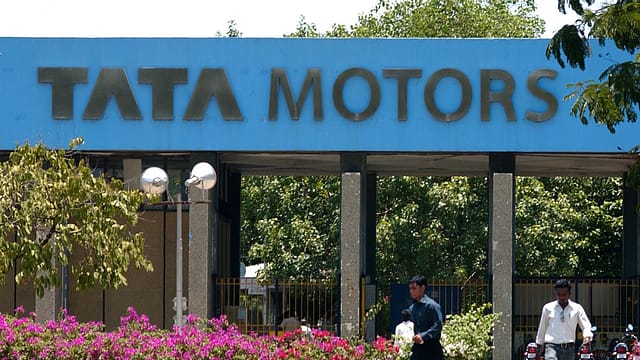Tata Motors shares hit record high
ADVERTISEMENT

Shares of Tata Motors hit an all-time high on Wednesday after foreign brokerage CLSA upgraded its target price on the stock to ₹690 from ₹624 earlier.
The auto stock opened at ₹579 on the National Stock Exchange (NSE) against its previous closing price of ₹573.10. The counter jumped over 3% today to hit an intraday high of ₹590 apiece before closing at ₹586.
The Tata Group company's stock has risen 49% on a year-to-date basis. The automaker's market capitalisation stood at ₹1.95 lakh crore.
CLSA has raised Tata Motors' earnings forecast for financial year 2024 and 2025 by 11% and 18%, respectively, citing higher margin estimates for Jaguar Land Rover (JLR) and the company's commercial vehicles business. CLSA expects JLR's EBITDA margin to be at 6.1% for the financial year 2024. For the CV business, the brokerage expects EBITDA margin of 10.5% in the ongoing financial year, in line with the management's double-digits guidance.
The stock price rise comes as electric vehicles (EVs) are estimated to account for 50% of Tata Motors' portfolio by 2030. Tata Motors, the largest player in India's EV space, has increased its volumes from around 1,300 to around 50,000 vehicles in three years.
"We successfully grew our leadership position by accelerating both EV adoption and the development of its enabling ecosystem. Going forward, we will continue to deliver on new product launches, enhancing capacities and drive EV penetration further to deliver market-beating growth in coming years," Shailesh Chandra, MD, passenger and electric vehicles, said in the company's recently released annual report.
The automaker expects the demand for electric vehicles to rapidly increase as more options are made available to customers and as support from a swiftly growing and improving ecosystem strengthen.
Tata Motors says it is actively pursuing deeper localisation of crucial EV systems to optimise cost structures and enhance the accessibility of EVs to a wider customer base.
Limited choices and high price points have hindered the penetration of EVs in the market. Despite a remarkable tenfold growth in the EV market over the last three years, their share in total vehicle sales stood at a mere 1.5% in 2022-23. The lack of choices at different price points and in body styles, has constrained the widespread adoption of EVs.
"We have the widest range of EV offerings, spanning across three body styles‑hatchbacks, sedans, and SUVs – which cater to both premium and mass market customer segments. As a result, we have achieved an impressive 9% penetration of EVs in our portfolio. Going forward, we plan to build on this strategic advantage by expanding our EV sales and after-sales network, as well as charging infrastructure across India. With these initiatives, we are poised to capitalise on the untapped opportunity and expand our reach to a broader customer base," the automaker says.